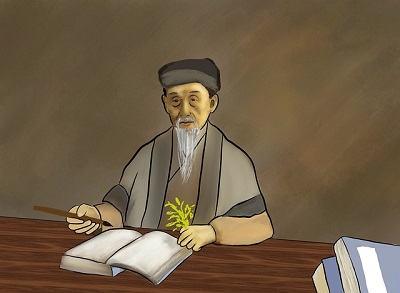Beyond Western Medicine: Unveiling the TCM Name for Epididymitis
Epididymitis, a common male ailment, is characterized by swelling and discomfort in the epididymis, which becomes enlarged and hardened, presenting palpable nodules. Traditional Chinese Medicine has proven to be effective in treating epididymitis. What is the name of epididymitis in TCM, and what are its types? I will teach you how to differentiate and diagnose epididymitis using simple TCM methods.

What is the name of epididymitis in TCM?
Epididymitis belongs to the category of "zhi yong" in Traditional Chinese Medicine. The male testes and epididymis are referred to as "kidney sons" in TCM, and "yong" relates primarily to abscesses or boils. Therefore, "zhi yong" describes the inflammatory, infectious disease of the testes and epididymis.
"Zhi Yong" is also known as "kidney abscess," "ovarian abscess," "yin abscess," and so on. According to the "Secret Record of the Divine Physician Hua Tuo," "Zhi Yong" refers to the pain, suppuration, and ulceration of the kidney, which, if not treated promptly, can endanger one's life.
The Traditional Chinese Medicine differentiation of epididymitis!
1. Damp-heat accumulation type
Symptoms: Sudden onset, severe swelling and pain in the testis, redness and swelling in the scrotum, obvious tenderness locally, pain can radiate to the lower abdomen and perineum. When suppurating, there is a fluctuating sensation on the local skin of the epididymis.
Pulse: String-taut or slippery, tongue red with yellow and greasy coating.
Treatment principle: Clear heat and dampness, detoxify and reduce swelling.
Prescription: Modified Gouqi Decoction, with herbs including Gouqi, Chuanlian, Qinjiao, Chenpi, Fangfeng, Ze Xie, Chishao, and Gancao.
2. Cold-damp stagnation type
Symptoms: Often with a history of acute onset, slow onset, swelling and drooping of the testis, mild or no pain, tenderness when pressing on the testis.
Pulse: String-thin or sunken-thin, tongue pale with thin white or white and greasy coating.
Treatment principle: Disperse cold and eliminate dampness, disperse stasis and reduce swelling.
Prescription: Danggui Si Ni Tang, with herbs including Danggui, Guizhi, Shaoyao, Xixin, Tongcao, Dazao, and Zhigancao.
3. Qi stagnation and blood stasis type
Symptoms: Often seen in those with external trauma to the testis, or those who have not been cured for a long time. The pain is severe, the testis is swollen, the pain is fixed and does not move, the tenderness is obvious, and the pain radiates to the lower abdomen, inguinal region and perineum. The scrotum is red and hot.
Pulse: String-serrated or sunken-serrated, tongue pale with stasis points and thin white coating.
Treatment principle: Promote qi circulation and blood flow, detoxify and reduce swelling.
Prescription: Modified Tao Hong Si Wu Tang, with herbs including Shudi, Danggui, Baishao, Chuanxiong, Taoren, and Honghua.
4. Liver and kidney yin deficiency type
Symptoms: Often seen in those with persistent subcutaneous abscess. There is swelling and pain, local tenderness, occasional redness and heat, or incomplete discharge of pus after rupture, accompanied by lumbago and weakness of the knees.
Pulse: Thin and weak or thin and rapid, tongue pale red with little coating.
Treatment principle: Nourish the liver and kidney, soften and disperse swelling.
Prescription: Modified Dabuyin Pill, with herbs including Shudihuang, Zhimu, Huangbai, Guijia, Zhujisui, as well as Yinhua, Lizhihe, Haizao, Dabie, and Jiaozhu.
5. Post-rupture deficiency type
Symptoms: The epididymis ulcerates and yellow, viscous pus flows out. After the rupture, the swelling subsides, accompanied by fatigue, lumbago, and dizziness.
Pulse: Thin and weak, tongue pale with thin coating.
Treatment principle: Tonify deficiency and promote healing of the wound.
Prescription: Sijunzi Decoction combined with Liuwei Dihuang Pill, with herbs including Huangqi, Baishao, Jiaozhu, Zaojiaoci, Baijiangcao, Lianqiao, and Tufuling.
The above is a detailed introduction to the diagnosis and treatment of epididymitis in traditional Chinese medicine. The use of various prescriptions should be carried out under the guidance of professionals.
In addition, the Diuretic and Anti-inflammatory Pill, which has the effects of softening hard lumps, promoting blood circulation, removing blood stasis, clearing heat and detoxification, promoting diuresis, and relieving stranguria, can also be used to treat epididymitis, curative effect is significant!
You may also be interested in:
How Long Can You Eliminate Epididymitis Discomfort After Actively Taking Medication?
Watch Out: These Foods May Worsen Your Epididymitis Symptoms
An Investigation into Epididymitis: Assessing its Self-Limiting Nature



